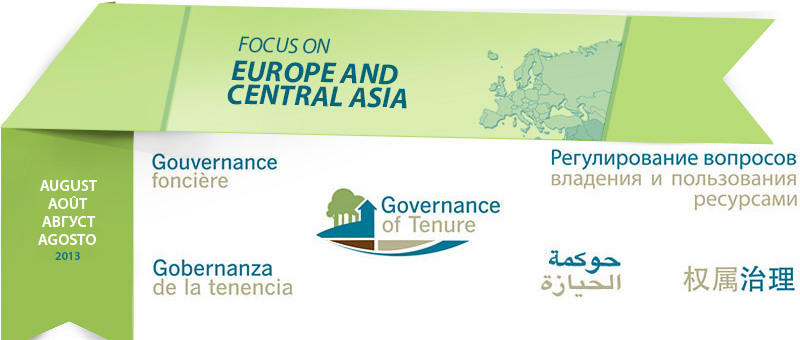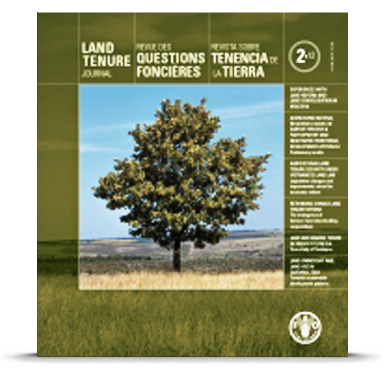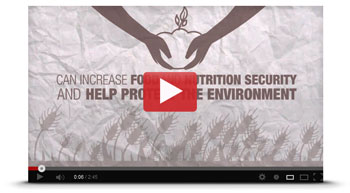Governance of tenure newsletter

The G8 leaders Communiqué from Lough Erne of 18 June 2013 states:
“To implement […] [the Voluntary Guidelines on the Responsible Governance of Tenure] and to support regional processes such as the Land Policy Initiative of the AU, this year we are establishing partnerships with certain developing countries and relevant international organisations to accelerate and target support to countries’ existing land governance programmes in conjunction with businesses, in particular farmers, and civil society.” Read the full Communiqué: EN
Watch the latest advocacy video on responsible governance of tenure
Regional dissemination programme
Over 360 participants from 85 countries took part in the regional awareness raising workshops on the Guidelines in Cameroon, Guyana, Rwanda, Jordan, Morocco, Ukraine and Fiji. Each workshop was attended by approximately 80 participants from 10-20 countries representing governments, civil society, the private sector, academia and regional organizations and from the land, fisheries and forest sectors. Regional awareness raising workshops provide an opportunity for participants to learn more about the Guidelines, to identify ways to improve governance of tenure and to propose ideas for implementing the Guidelines in their country or region. More workshops are coming up in Thailand, Colombia and Bulgaria. Stay tuned for more information.

The Guidelines and Family Farming: opportunities for engagement of civil society
On June 20, an FAO conference side event focused on the role of the Guidelines in civil society support to family farming. Various discussants agreed that secure tenure arrangements and responsible governance of tenure are key to family farming. The International Year of Family Farming 2014 was presented as an opportunity to further promote the Guidelines.
In December 2011, the UN General Assembly declared 2014 to be the International Year of Family Farming and invited FAO to facilitate implementation of the International Year in collaboration with its partners.
Land Tenure Journal – new edition online
The latest edition of the FAO Land Tenure Journal can now be downloaded from the web. It contains a diversity of articles ranging geographically from Moldova to French Polynesia, in scale from China to Sardinia, and in technical focus from land consolidation to how tenure of land and fisheries are linked. All of the articles reflect issues of governance of tenure, and all fall within the remit of the Guidelines. Featured articles are:
- Experiences with land reform and land consolidation in Moldova
- Addressing natural resources issues in Darfur through a Participatory and Negotiated Territorial Development approach: preliminary results
- Agricultural land tenure security under Vietnamese land law: legislative changes and improvements since the economic reform
- Rethinking China’s land tenure reform: the emergence of farmers’ land shareholding cooperatives
- Land and marine tenure in French Polynesia: case study of Teahupoo
- Land ownership and land use in Sardinia, Italy: towards sustainable development patterns
More publications will become available soon, including Governance of Tenure Technical Guide 2: Improving Governance of Forest Tenure and a special edition of the Land Tenure Journal on Fisheries Tenure. Visit our information resources website for a full list of publications.

Making it happen – FAO collaboration in Europe and Central Asia
Russian Federation - Extensive improvements of state registration and cadastre services planned in the next 5 years
Nation-wide improvements in quality and availability of state registration and cadastre services are planned over the next five years in the Russian Federation. Currently 24 percent of all applications are processed electronically and the aim is to reach 70 percent by 2018. The Russian Federation Service for State Registration, Cadastre and Cartography (RosReestr) began formal implementation of an ambitious roadmap on 1 January 2013.
Many of the planned reforms are already under pilot implementation and most of the required underlying IT infrastructure has been installed. RosReestr has planned to concentrate 90 percent of back office operations into six centers in economically less developed regions. Simplified procedures at a local level, improved staff efficiency and improved office and staff management are planned to save time and funds and minimize opportunities for corrupt practices. A pilot implementation of the first interregional “mega” IT centre in Krasnoyarsk, Siberia, was successfully completed in May 2013.
FAO and the World Bank are committed to continue their support to the Government of Russia through investment and knowledge sharing in order to achieve the goals of the project, and to share information about the country’s rapidly evolving property registration system for the benefit of other countries in the region and beyond that are undertaking similar reforms.
Read more about the initiative: EN | RU

Ukraine – Improving efficiency, transparency and access to information in the property sector
On January 14, 2013 Ukraine began the implementation of a new Law on Cadastre, a new Law on Registration and the operation of an electronic cadastre system that is improving efficiency, transparency and access to information in the property sector. The Rural Land Titling and Cadastre Development Project, financed by the World Bank and assisted technically by FAO, supported the issuance of state land deeds and the development of mapping and the electronic cadastral system.
The national rollout of the system was completed and included:
- training of 1900 system operators;
- scanning, indexing and verification of 16.7 million property records;
- provision of computers, software and broadband to all 592 local offices to communicate nationally and store all records in a single national database;
- an on-line portal with a cadastral map allowing users to submit queries about land parcels and to request correction of errors;
- a geographic information system that helps prevent the superimposition of parcels;
- automatic data exchange with the State Registration Service, which registers legal rights to land parcel.
Future goals for the IT system stress continual quality improvement through plans to:
- increase the coverage and the quality of data;
- offer new e-services;
- link property registration and cadastre with other key government registers;
- build standardized Spatial Data Infrastructure
Ukraine has enormous potential for growth in agriculture and in cities. To support these growth processes, governance of tenure, including accurate and authoritative spatial information, creates enabling conditions. FAO, working in partnership with the World Bank, will continue to support the improvement of governance of tenure of land under a new Bank proposal. FAO is also continuing its dialogue with Ukraine about land governance within the framework of the Guidelines.
Find out more about the initiative: EN | RU

Western Balkans: Making land administration services more accessible to vulnerable groups
A pilot Leadership Program on Inclusive and Informed Land Administration in the Western Balkans helped target countries (Albania, Bosnia and Herzegovina, Kosovo, Macedonia, Montenegro and Serbia) form teams of land tenure, social and gender specialists, representing policy-makers, service providers (both from public and private sectors) and NGOs. This joint FAO and World Bank initiative began in May 2013 and has led to the formulation of reform proposals to make land administration services more accessible to vulnerable groups.
Obstacles that prevent vulnerable groups from registering and enforcing their land rights were identified and further specified through discussions during a week-long leadership workshop organized in Montenegro in June 2013. The workshop combined technical content with leadership skills building activities. The Guidelines and Governance of Tenure Technical Guide 1: Governing land for women and men helped teams improve their initial proposals. Action plans will now be executed.


